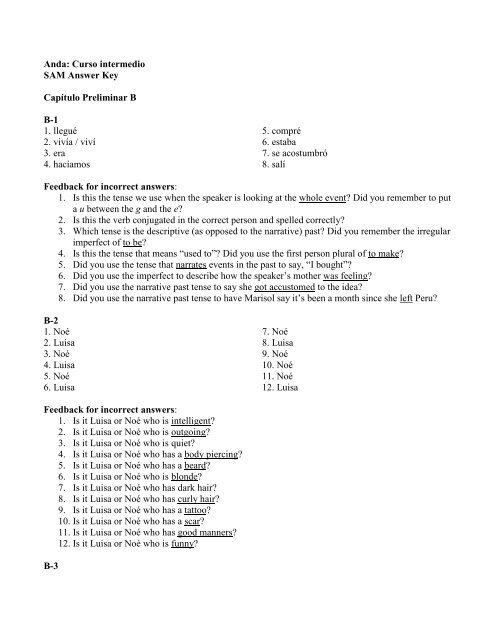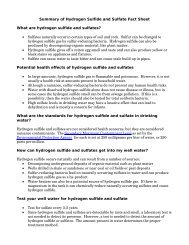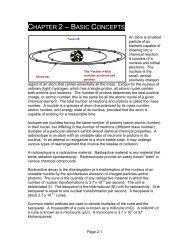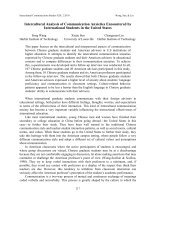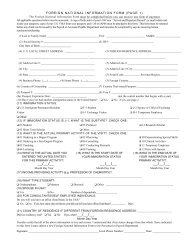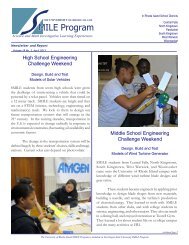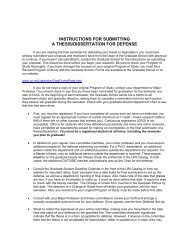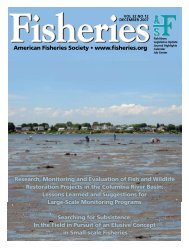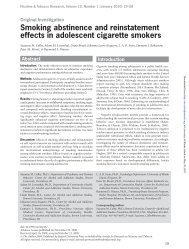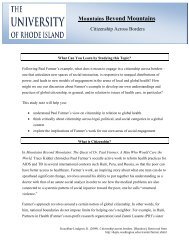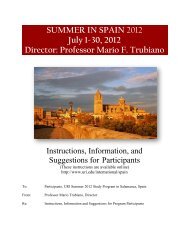Anda: Curso intermedio
Anda: Curso intermedio
Anda: Curso intermedio
Create successful ePaper yourself
Turn your PDF publications into a flip-book with our unique Google optimized e-Paper software.
<strong>Anda</strong>: <strong>Curso</strong> <strong>intermedio</strong><br />
SAM Answer Key<br />
Capítulo Preliminar B<br />
B-1<br />
1. llegué<br />
2. vivía / viví<br />
3. era<br />
4. hacíamos<br />
5. compré<br />
6. estaba<br />
7. se acostumbró<br />
8. salí<br />
Feedback for incorrect answers:<br />
1. Is this the tense we use when the speaker is looking at the whole event? Did you remember to put<br />
a u between the g and the e?<br />
2. Is this the verb conjugated in the correct person and spelled correctly?<br />
3. Which tense is the descriptive (as opposed to the narrative) past? Did you remember the irregular<br />
imperfect of to be?<br />
4. Is this the tense that means “used to”? Did you use the first person plural of to make?<br />
5. Did you use the tense that narrates events in the past to say, “I bought”?<br />
6. Did you use the imperfect to describe how the speaker’s mother was feeling?<br />
7. Did you use the narrative past tense to say she got accustomed to the idea?<br />
8. Did you use the narrative past tense to have Marisol say it’s been a month since she left Peru?<br />
B-2<br />
1. Noé<br />
2. Luisa<br />
3. Noé<br />
4. Luisa<br />
5. Noé<br />
6. Luisa<br />
Feedback for incorrect answers:<br />
1. Is it Luisa or Noé who is intelligent?<br />
2. Is it Luisa or Noé who is outgoing?<br />
3. Is it Luisa or Noé who is quiet?<br />
4. Is it Luisa or Noé who has a body piercing?<br />
5. Is it Luisa or Noé who has a beard?<br />
6. Is it Luisa or Noé who is blonde?<br />
7. Is it Luisa or Noé who has dark hair?<br />
8. Is it Luisa or Noé who has curly hair?<br />
9. Is it Luisa or Noé who has a tattoo?<br />
10. Is it Luisa or Noé who has a scar?<br />
11. Is it Luisa or Noé who has good manners?<br />
12. Is it Luisa or Noé who is funny?<br />
B-3<br />
7. Noé<br />
8. Luisa<br />
9. Noé<br />
10. Noé<br />
11. Noé<br />
12. Luisa
Answers will vary.<br />
B-4<br />
1. A Marisol le fascina la comida italiana./La comida italiana le fascina a Marisol./A Marisol la comida<br />
italiana le fascina.<br />
2. A David le interesa la historia norteamericana./La historia norteamericana le interesa a David./A<br />
David la historia norteamericana le interesa.<br />
3. A Marisol le encantan las telenovelas./Las telenovelas le encantan a Marisol./A Marisol las<br />
telenovelas le encantan.<br />
4. A David y Marisol les molestan las personas egoístas./Las personas egoístas les molestan a David y<br />
Marisol./A David y Marisol las personas egoístas les<br />
molestan. / A David y a Marisol les molestan las personas egoístas./Las personas egoístas les molestan a<br />
David y a Marisol./A David y a Marisol las personas egoístas les molestan.<br />
5. A David y Marisol tú les caes bien./Tú les caes bien a David y Marisol./A David y a Marisol tú les<br />
caes bien./Tú les caes bien a David y a Marisol./A David y a Marisol tú les caes bien.<br />
Feedback for incorrect answers:<br />
1. Did you say that Italian food is very pleasing to Marisol?<br />
2. Did you say that American history is interesting to David?<br />
3. Did you say that soap operas are very pleasing to Marisol?<br />
4. Did you say that selfish people are bothersome to David and Marisol? Did you remember to<br />
make the indirect object pronoun plural?<br />
5. Did you say that David and Marisol like you? That is, that you (the subject) strike them<br />
favorably?<br />
B-5<br />
Answers will vary.<br />
B-6<br />
1. se porta mal<br />
2. celoso<br />
3. confundida<br />
4. orgullosa<br />
5. tacaña<br />
6. flojo<br />
7. cómoda<br />
Feedback for incorrect answers:<br />
1. Did you say that Mónica always behaves badly?<br />
2. Did you say that Enrique is always jealous of the lovers that Mónica has?<br />
3. Did you say that Isabel is always confused?<br />
4. Did you say that doña Inmaculada is a proud woman?<br />
5. Did you say that doña Inmaculada is stingy?<br />
6. Did you say that don Eugenio is lazy?<br />
7. Did you say that don Eugenio likes to have a comfortable (easy) life?<br />
B-7<br />
Answers will vary.<br />
B-8
1. Marisol no ha ido a la oficina del profesor.<br />
2. Marisol, Carrie y Rosa se han reunido para estudiar.<br />
3. Rosa ha hablado con unos compañeros de clase.<br />
4. Marisol y yo no hemos repasado los términos difíciles.<br />
5. Rosa ha hecho todas las actividades de repaso.<br />
Feedback for incorrect answers:<br />
1. Did use the third person singular of the auxiliary verb to have and the past participle of to go?<br />
2. Did you put the third person reflexive pronoun before the auxiliary verb to have? Did you use the<br />
third person plural of to have? The past participle of to meet?<br />
3. Did you use the third person singular of the auxiliary verb to have and the past participle of to<br />
speak?<br />
4. Did you use the first person plural of the auxiliary verb to have and the past participle of to<br />
review?<br />
5. Did you use the third person singular of the auxiliary verb to have and the irregular past<br />
participle of to do?<br />
B-9<br />
Selected items:<br />
hablar con una agencia de empleo<br />
buscar en el Internet<br />
escribir un currículum (résumé)<br />
Feedback for incorrect answers:<br />
Did you select three items that David has already done?<br />
B-10<br />
1. d<br />
2. b<br />
3. c<br />
4. e<br />
5. a<br />
Feedback for incorrect answers:<br />
1. Does Marisol describe her mother, Liliana, as outgoing?<br />
2. Does Marisol describe her father, Fernando, as quiet?<br />
3. Does Marisol describe her brother, Pablo, as well-mannered?<br />
4. Does Marisol describe her brother, Raúl, as conceited?<br />
5. Does Marisol describe her grandmother, Perla, as a pleasant person?<br />
B-11<br />
Answers will vary.<br />
B-12<br />
Selected items:<br />
boxear<br />
jugar al hockey<br />
jugar al voleibol
practicar atletismo<br />
practicar ciclismo<br />
Feedback for incorrect answers:<br />
Did you select five sports that you saw in the picture?<br />
B-13<br />
1. Alquilemos un video.<br />
2. Comamos en un restaurante italiano.<br />
3. Juguemos al tenis.<br />
4. Corramos en el parque.<br />
5. Miremos la televisión.<br />
Feedback for incorrect answers:<br />
1. Did you say, “Let’s rent...”, using the first person plural command?<br />
2. Did you say, “Let’s eat...”, using the first person plural command?<br />
3. Did you say, “Let’s play...”, using the first person plural command?<br />
4. Did you say, “Let’s run...”, using the first person plural command?<br />
5. Did you say, “Let’s watch...”, using the first person plural command?<br />
B-14<br />
Answers will vary.<br />
B-15<br />
1. h<br />
2. a<br />
3. j<br />
4. e<br />
5. d<br />
Feedback for incorrect answers:<br />
1. Is this what bucear means?<br />
2. Is this what coleccionar sellos means?<br />
3. Is this what coser means?<br />
4. Is this what jugar al ajedrez means?<br />
5. Is this what jugar a las damas means?<br />
6. Is this what jugar al póquer means?<br />
7. Is this what jugar videojuegos means?<br />
8. Is this what pasear en barco means?<br />
9. Is this what pescar means?<br />
10. Is this what tejer means?<br />
6. f<br />
7. g<br />
8. i<br />
9. b<br />
10. c<br />
B-16<br />
1. Recomiendo que tires un platillo volador en el cuadrángulo./Recomiendo que tú tires un platillo<br />
volador en el cuadrángulo.
2. Sugiero que asistas a una reunión del club de lectura./Sugiero que tú asistas a una reunión del club de<br />
lectura.<br />
3. Quiero que te hagas miembro del club de ajedrez./Quiero que tú te hagas miembro del club de<br />
ajedrez.<br />
4. Aconsejo que hables con el presidente del club de arte./Aconsejo que tú hables con el presidente del<br />
club de arte.<br />
5. Sugiero que comentes en un blog./Sugiero que tú comentes en un blog.<br />
Feedback for incorrect answers:<br />
1. Did you use the present indicative of to recommend in the main clause and the second person of<br />
the present subjunctive of to throw in the subordinate clause?<br />
2. Did you use the present indicative of to suggest in the main clause and the second person of the<br />
present subjunctive of to attend in the subordinate clause?<br />
3. Did you use the present indicative of to want in the main clause and the second person of the<br />
present subjunctive of to become in the subordinate clause? Did you remember to put the<br />
reflexive pronoun before the conjugated verb to say become?<br />
4. Did you use the present indicative of to advise in the main clause and the second person of the<br />
present subjunctive of to speak in the subordinate clause?<br />
5. Did you use the present indicative of to suggest in the main clause and the second person of the<br />
present subjunctive of to comment in the subordinate clause?<br />
B-17<br />
1. extrañes<br />
2. llames<br />
3. se mantengan<br />
Feedback for incorrect answers:<br />
4. hablen<br />
5. ayude<br />
6. hagamos<br />
1. Is this the second person singular of to miss in the present subjunctive?<br />
2. Is this the second person singular of to call in the present subjunctive?<br />
3. Is this the second person plural (formal) of to remain in the present subjunctive? Did you<br />
remember to put the reflexive pronoun before the conjugated verb?<br />
4. Is this the second person plural (formal) of to speak in the present subjunctive?<br />
5. Is this the first person singular of to help in the present subjunctive?<br />
6. Is this the first person plural of to do in the present subjunctive?<br />
B-18<br />
Answers will vary.<br />
B-19<br />
1. a<br />
2. c<br />
3. d<br />
4. a<br />
5. c<br />
Feedback for incorrect answers:<br />
1. Does the first house mentioned by Marisol have this/these?
2. Is this why Marisol says it’s good to rent a house with a garage?<br />
3. Listen again to Marisol’s description of the second house.<br />
4. Is this true of the third house Marisol describes?<br />
5. Is this the house that Marisol wants to see?<br />
B-20<br />
Answers will vary.<br />
B-21<br />
1. El<br />
2. las<br />
3. el<br />
4. los<br />
5. el<br />
6. la<br />
7. El<br />
8. x<br />
9. x<br />
10. un<br />
11. x<br />
Feedback for incorrect answers:<br />
1. Is the article used to say, “on Friday”?<br />
2. Is the article used to give the time?<br />
3. Is the article used when speaking about a person using their title?<br />
4. Does this say, “...to sign the papers...”?<br />
5. Is the article used to say, “on Sunday”?<br />
6. Does this say, “in the afternoon”?<br />
7. Does this say, “The electrician...”?<br />
8. Is an article needed to say, “He is Venezuelan...”?<br />
9. Is the article used with the name of a language after the verb to speak?<br />
10. Did you use the indefinite article? (Remember, no article is used when a person is identified by<br />
profession, unless the profession is modified, as when saying ...”a very good electrician”.)<br />
11. Is any article used before “thousand” in Spanish?<br />
B-22<br />
Answers will vary.<br />
B-23<br />
Selected words:<br />
la alacena<br />
la cafetera<br />
el horno<br />
el mostrador<br />
la olla<br />
la sartén<br />
Feedback for incorrect answers:<br />
Did you select six items that can be seen in the picture of the kitchen?<br />
B-24
1. quieras<br />
2. puedas<br />
3. veamos<br />
4. tengamos<br />
5. llame<br />
Feedback for incorrect answers:<br />
1. Is this the second person familiar of the present subjunctive of to want?<br />
2. Is this the second person familiar of the present subjunctive of to be able?<br />
3. Is this the first person plural of the present subjunctive of to see?<br />
4. Is this the first person plural of the present subjunctive of to have?<br />
5. Is this the first person singular of the present subjunctive of to call?<br />
B-25<br />
Answers will vary.<br />
B-26<br />
1. Ya están escritas./Ya están escritas para los invitados.<br />
2. Ya están puestas./Ya está puestas en las invitaciones.<br />
3. Ya están mandadas.<br />
4. Ya está pedido.<br />
5. Ya está comprado.<br />
Feedback for incorrect answers:<br />
1. Did you say they (the directions) are already written? Does “written” agree with “directions”?<br />
2. Did you say they (the directions) are already put on the invitations? Does “put” agree with<br />
“directions”?<br />
3. Did you say they (the invitations) are already sent? Does “sent” agree with invitations?<br />
4. Did you say it (the cake) is already ordered? Does “ordered” agree with “cake”?<br />
5. Did you say it (the gift) is already bought? Does “bought” agree with “gift”?<br />
B-27<br />
1. Falso<br />
2. Cierto<br />
3. Cierto<br />
4. Falso<br />
5. Cierto<br />
6. Falso<br />
7. Cierto<br />
Feedback for incorrect answers:<br />
1. Was Marisol´s favorite birthday party her quinceañera?<br />
2. Did Marisol´s siblings participate in her quinceañera?<br />
3. Did Luisa, Alejandro and three other friends come to the party last year?<br />
4. Did it rain a lot the night of the party, and because of that, did they go to a club?<br />
5. Did Luisa give her a purse?<br />
6. Did Alejandro give her an engagement ring?<br />
7. Does Marisol prefer small, intimate parties, not extravagant ones?<br />
B-28
Answers will vary.<br />
B-29<br />
1. había decidido<br />
2. había salido<br />
3. había comprado<br />
4. había escrito<br />
5. me había roto<br />
Feedback for incorrect answers:<br />
1. Did you use the imperfect of the auxiliary verb to have with the past participle of to decide?<br />
2. Did you use the imperfect of the auxiliary verb to have with the past participle of to go out?<br />
3. Did you use the imperfect of the auxiliary verb to have with the past participle of to buy?<br />
4. Did you use the imperfect of the auxiliary verb to have with the (irregular) past participle of to<br />
write?<br />
5. Did you use the imperfect of the auxiliary verb to have with the (irregular) past participle of to<br />
break?<br />
B-30<br />
Answers will vary.<br />
B-31<br />
1. a<br />
2. i<br />
3. b<br />
4. f<br />
5. d<br />
Feedback for incorrect answers:<br />
1. Is this what añadir means?<br />
2. Is this what asar means?<br />
3. Is this what batir means?<br />
4. Is this what calentar means?<br />
5. Is this what cubrir means?<br />
6. Is this what derretir means?<br />
7. Is this what freír means?<br />
8. Is this what hervir means?<br />
9. Is this what recalentar means?<br />
B-32<br />
Answers will vary.<br />
B-33<br />
1. Es importante que hayas investigado tanto.<br />
2. Es bueno que hayas tenido apuntes muy buenos.<br />
3. Es mejor que hayas empezado.<br />
4. Es importante que hayas hablado con él.<br />
5. Es una lástima que ustedes no hayan dormido.<br />
6. g<br />
7. e<br />
8. c<br />
9. h
Feedback for incorrect answers:<br />
All: Is the verb in the main clause in the present indicative and the verb in the subordinate clause in<br />
the present perfect subjunctive?<br />
B-34<br />
Selected words:<br />
la arena<br />
los lentes de sol<br />
la sombrilla<br />
tomar el sol<br />
Feedback for incorrect answers:<br />
Did you select four items that relate to a desert island?<br />
B-35<br />
1. un vehículo utilitario deportivo<br />
2. una limosina<br />
3. el seguro de coche<br />
4. una transmisión<br />
5. un navegador personal<br />
Feedback for incorrect answers:<br />
1. Does David say he doesn’t want a big car like an SUV?<br />
2. Does David say that neither does he want a car as elegant as a limousine?<br />
3. Does David say he doesn’t want to pay much for car insurance?<br />
4. Does David say that the car he had in Colombia had a bad transmission?<br />
5. Does David say he also wants to have a GPS, since he doesn’t like to get lost?<br />
B-36<br />
1. que/quien<br />
2. que<br />
3. quien<br />
4. que<br />
5. quien<br />
Feedback for incorrect answers:<br />
1. [no feedback]<br />
2. Which relative pronoun refers to things, as well as to people?<br />
3. Which relative pronoun refers to a person or persons when it follows a simple preposition such<br />
as with?<br />
4. Which relative pronoun refers to things, as well as to people?<br />
5. Which relative pronoun refers to a person or persons when it follows a simple preposition such<br />
as a?<br />
B-37<br />
1. un mapa<br />
2. un itinerario<br />
3. la carretera<br />
4. un atasco<br />
5. alquilar un coche
Feedback for incorrect answers:<br />
1. Is this something used to keep from getting lost?<br />
2. Is this a plan for a trip?<br />
3. Is this a type of roadway where one can drive fast?<br />
4. Is this something that happens in big cities where there are a lot of cars?<br />
5. Is David telling them it is a shame they can’t rent a car?<br />
B-38<br />
1. los monumentos nacionales<br />
2. el guía<br />
3. un portero<br />
4. el servicio<br />
5. un recuerdo<br />
Feedback for incorrect answers:<br />
1. Does Marisol say that they went to see the national monuments?<br />
2. Does Marisol say that the guide gave them a lot of information?<br />
3. Does Marisol say that there is a doorman who always greets them when they enter the hotel?<br />
4. Does Marisol say that last night they used room service?<br />
5. Does Marisol say that she’ll buy you a souvenir of the White House?<br />
B-39<br />
1. informática<br />
2. contraseña<br />
3. enlace<br />
4. archivos<br />
5. correo de voz<br />
Feedback for incorrect answers:<br />
1. Does David’s friend Joe study computer science?<br />
2. Does David say that someone tried to steal his password?<br />
3. Does David say that his friend Joe thinks it happened because David clicked on a link in an email<br />
he received?<br />
4. Does David say that he didn’t lose any of his files, fortunately?<br />
5. Does David tell Carrie to call, and if he doesn’t answer, to leave a message on his voice mail?<br />
B-40<br />
1. presente de subjuntivo<br />
2. presente de indicativo<br />
3. presente de subjuntivo<br />
Feedback for incorrect answers:<br />
1. Does this clause refer to a known, specific roommate?<br />
2. Does this clause refer to a known, specific boy?<br />
3. Does this clause refer to a known, specific person?<br />
4. Does this clause refer to a known, specific student?<br />
5. Does this clause refer to a known, specific boy?<br />
B-41<br />
1. sea<br />
2. comprenda<br />
3. venga<br />
4. quiera<br />
4. presente de indicativo<br />
5. presente de indicativo<br />
5. recomienda<br />
6. menciona
Feedback for incorrect answers:<br />
1. Does Carrie have a known, specific tutor in mind? If not, use the subjunctive.<br />
2. Does Carrie have a known, specific tutor in mind? If not, use the subjunctive.<br />
3. Does Carrie have a known, specific tutor in mind? If not, use the subjunctive.<br />
4. Does Carrie have a known, specific tutor in mind? If not, use the subjunctive.<br />
5. Does Carrie have a known, specific woman in mind? If so, use the indicative.<br />
B-42<br />
1. a<br />
2. d<br />
3. f<br />
4. g<br />
5. c<br />
6. b<br />
Feedback for incorrect answers:<br />
1. Is this the order in which David would start the computer?<br />
2. Is this the order in which David would cut the section from the original work?<br />
3. Is this the order in which David would save the file?<br />
4. Is this the order in which David would make a back-up file?<br />
5. Is this the order in which David would click on the icons of the two papers to open them?<br />
6. Is this the order in which David would wait for the connection (the computer to boot up)?<br />
7. Is this the order in which David would paste the section into the second paper?<br />
B-43<br />
Answers will vary.<br />
B-44<br />
1. Cisco<br />
2. Cisco<br />
3. Javier<br />
4. Javier<br />
5. Celia<br />
6. No se dice.<br />
7. Celia<br />
8. No se dice.<br />
7. e<br />
9. Celia<br />
10. Cisco<br />
Feedback for incorrect answers:<br />
1. Is this a mysterious person?<br />
2. Is this a ladies’ man (“skirt-chaser”)?<br />
3. Is this a person who likes to teach?<br />
4. Is this a person who loves sports?<br />
5. Did this person work for the FBI?<br />
6. Does this episode say whether anyone is in love with Celia?<br />
7. Did this person get sick in some episodes?<br />
8. Does this episode say whether anyone stole some maps from the library?<br />
9. Did this person receive a note in the cafe?<br />
10. Is this person a journalist?<br />
B-45, 46, 47, 48, 49<br />
Answers will vary.


